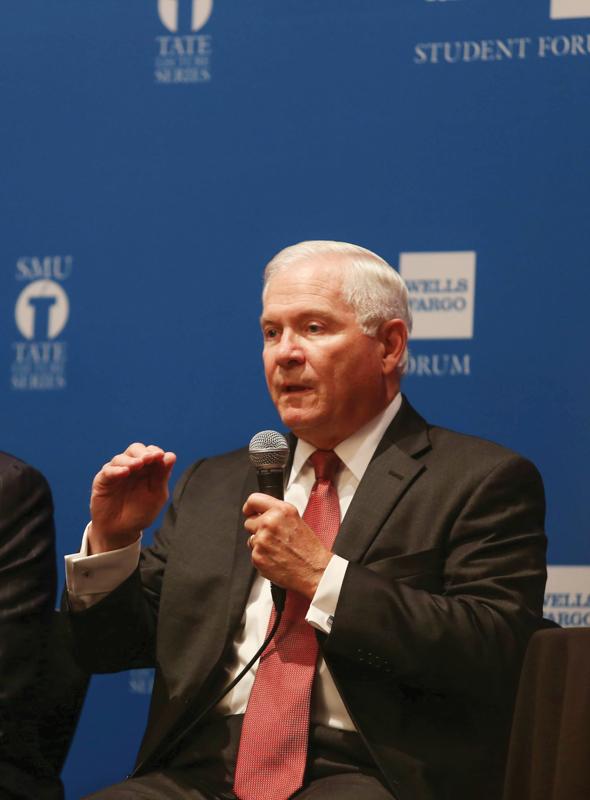By Scott Mitchell
Arts & Entertainment Editor

by an audience member.
Syria leapt into American media headlines recently, following the alleged use of chemical weapons by President Bashar al-Assad’s regime against Syrian rebel forces. The civil war has lasted two years and created more than two million refugees, according to the Associated Press, and America began debates whether to intervene.
Southern Methodist University’s most recent guests in the Tate Lecture Series were experts who could give attendees some insight into the foreign policy and military decision-making of the Obama Administration during this time of possible military intervention.
The SMU Tate Lecture Series hosted the guest lecturers Sept. 17. Three political commentators were invited to speak: Robert Gates, U.S. Secretary of Defense from 2006-2011 and director of the Central Intelligence Agency from 1991-1993, Leon Panetta, U.S. Secretary of Defense from 2011-2013, and David Gergen, a political adviser who served four presidents.
The lecture had an open forum format, allowing SMU students to ask questions directly to the guest lecturers. With the rising interests of America in regard to Syria, many of the questions focused on American foreign policy and global policing.
Gergen stressed that the media affects how Americans perceive foreign policy. The media, specifically the print press, “have all been serious observers of this scene [in Syria],” Gergen said. “The Syria story is a very hard story for the press to cover because there are so few reporters in there. It’s been a very, very hard story to convey, and when it looked like it was actually about to be going down, the press wasn’t sure where to go.”
Mian Ahad Hayaud-Din, Brookhaven College government professor, had his own critiques of the American media’s coverage of Syria. “The American media does a lousy job of providing the public with objective background information. It does not accurately discuss all the options and does not disclose the various consequences for each option,” Hayaud-Din said.
The Obama administration seemed just as apprehensive as the media in its approach to Syria. Even with Obama’s power as Commander in Chief, he has sought the approval of Congress before involving the U.S. military in the Syrian conflict, something not required of him. Panetta said the president’s reliance on Congress to make a determination for limited military intervention is fraught with problems.
“In this case, in regards to the kind of limited action that was involved here, I think that the president, acting as Commander in Chief having come to that determination, then had the responsibility to take action,” Panetta said. “Our forefathers understood that you can’t just take all the decisions of the Commander in Chief and have Congress, today 530 members that sometimes have a hard time deciding what time of day it is, suddenly decide what’s in our national security interest and what kind of action we should take.”
Gates had something more ominous to say about threatening military intervention: “Don’t ever cock the pistol unless you’re ready to fire it.”
Gates said the methodical approach the government has taken toward involvement in Syria has to do with the history of the recent wars in Iraq and Afghanistan. The public’s sour view of these wars may affect the way this conflict is approached. “We never fully grasp the unintended consequences of military action,” Gates said. “Those two wars have reminded us that, more often than not when we go to war, we know very little about our adversary.”
Hayaud-Din said regardless of public support, the U.S. has heavy interests in the region and needs to make sure human rights are not further violated in the civil war. “Lots of innocent civilians are being brutally killed,” Hayaud-Din said. “There are crimes against humanity taking place every day, and the international ban on chemical weapons has been violated. The United States is compelled to act with or without the [United Nations].”
The U.S. will act in accordance with the U.N., it seems. On Sept. 23, Assad’s regime agreed to the Russia-U.S. chemical weapon seizure plan, according to the Associated Press. The agreement, created in Geneva the week of Sept. 16, will put inspectors on Syrian ground to check chemical weapon manufacturing sites by November of this year.






